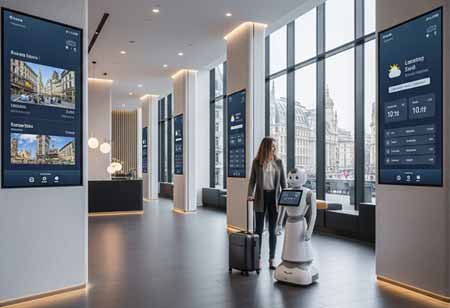Thank you for Subscribing to Hospitality Business Review Weekly Brief
The Future of European Hospitality Driven by IoT
Europe's hospitality sector is evolving with IoT, enhancing guest experiences and operational efficiency, while driving sustainability through smart technology and personalised services in hotels.

By
Hospitality Business Review | Wednesday, September 03, 2025
Stay ahead of the industry with exclusive feature stories on the top companies, expert insights and the latest news delivered straight to your inbox. Subscribe today.
Fremont, CA: The Internet of Things (IoT) is driving the hospitality industry in Europe, revolutionizing hotel management, service provision, and visitor interaction throughout the continent's diverse and rich tourism scene. IoT-powered smart hotels are not merely a vision of the future; they are already a reality and are actively changing the whole hospitality value chain throughout the continent.
Enhancing the Guest Experience: From Arrival to Departure
The integration of IoT technologies in European smart hotels is redefining the guest experience, delivering a level of personalisation and efficiency that was once unimaginable. Traditional, time-consuming check-in processes have given way to seamless, contactless solutions, with mobile apps and digital keys enabling guests to access their rooms effortlessly. Some properties have gone a step further by incorporating biometric tokens, such as facial recognition, for event check-ins, creating an even smoother arrival experience. Within the rooms, IoT-enabled systems empower guests to tailor their environment to their exact preferences, adjusting lighting, temperature, entertainment options, and even water settings through a smartphone or in-room tablet. Voice-activated assistants further enhance convenience, allowing guests to request services, obtain information, or control amenities without direct staff interaction. Behind the scenes, IoT sensors proactively support service delivery by notifying housekeeping when a room is vacated or alerting staff to room service trays awaiting collection, ensuring faster turnover and a more polished environment. Location-based technologies, leveraging Bluetooth and GPS, enable hotels to provide contextual information and targeted promotions, such as gym offers near fitness areas or guidance to local attractions, enriching the overall guest journey.
Optimising Operations and Driving Efficiency
Beyond elevating the guest experience, the IoT is transforming hotel operations by driving efficiency and delivering measurable cost savings across the value chain. Automated housekeeping and maintenance systems equipped with integrated sensors can monitor cleanliness in real time, alerting staff when attention is required. Similarly, predictive maintenance enabled by sensor-driven equipment monitoring allows potential issues to be addressed before they escalate, minimising downtime and enhancing overall guest comfort.
Intelligent energy management further contributes to operational efficiency and sustainability. Smart thermostats automatically adjust heating and cooling based on room occupancy, while connected lighting systems switch off when the space is unoccupied. These measures not only reduce energy consumption and operational costs but also align with Europe’s increasing emphasis on sustainability.
Inventory management is also streamlined through IoT-enabled smart shelves that track stock levels in real time and send automated alerts when supplies are low. This reduces human error, automates a previously manual process, and allows staff to focus on higher-value tasks.
Security and asset management also benefit, with IoT-powered smart locks and keyless entry systems providing secure and seamless access. Beyond guest rooms, IoT facilitates asset tracking—such as cleaning carts or luggage racks—and supports proactive threat detection through sensors capable of identifying broken windows or unusual activity.
Smart hotels in Europe are expected to continue growing and becoming more sophisticated due to technological advancements and evolving guest expectations. AI-powered IoT systems will provide personalised experiences, while automation and robotics will handle routine tasks. Immersive technologies, such as VR and AR, will enhance the guest journey, while IoT integration will optimise common areas, conference facilities, and outdoor spaces. Hybrid models will redefine hotels as multi-purpose destinations, offering co-working spaces, dining options, and wellness facilities.
IoT is not merely a technological upgrade for European hotels; it is a fundamental shift that is redefining the entire hospitality value chain. By enhancing guest experiences, optimising operations, and driving sustainability, smart hotels are poised to lead the industry into a new era of efficiency, personalisation, and competitive advantage across Europe. The key to success will lie in navigating the challenges of implementation while embracing the immense potential of interconnected intelligence.







